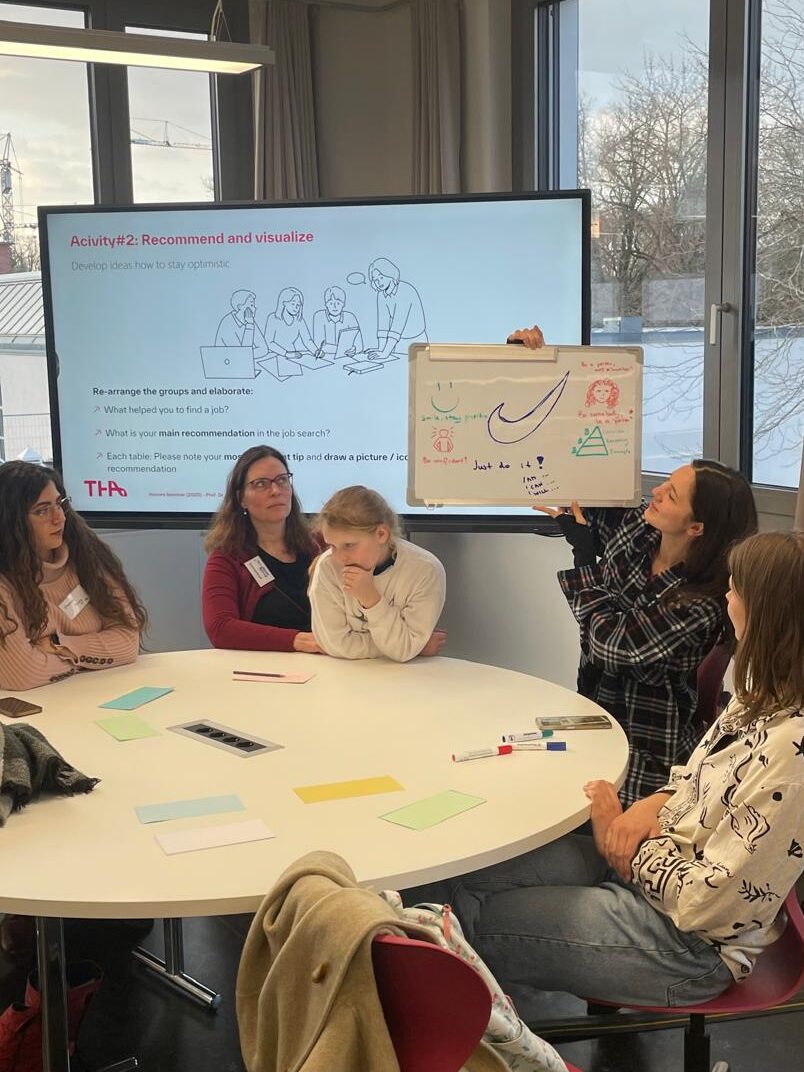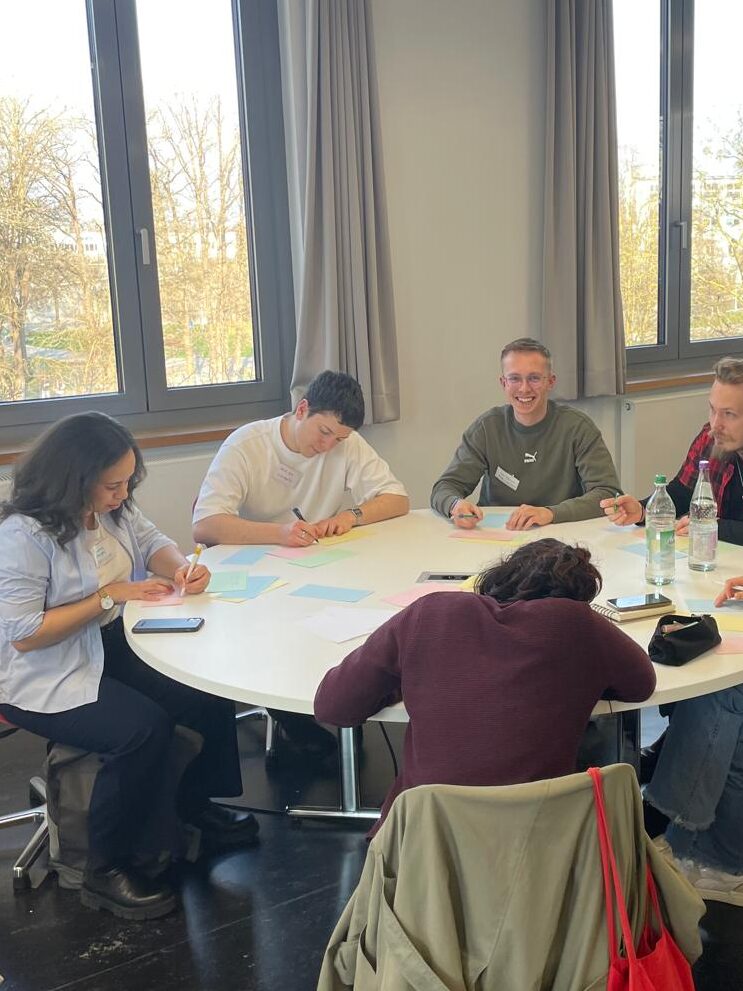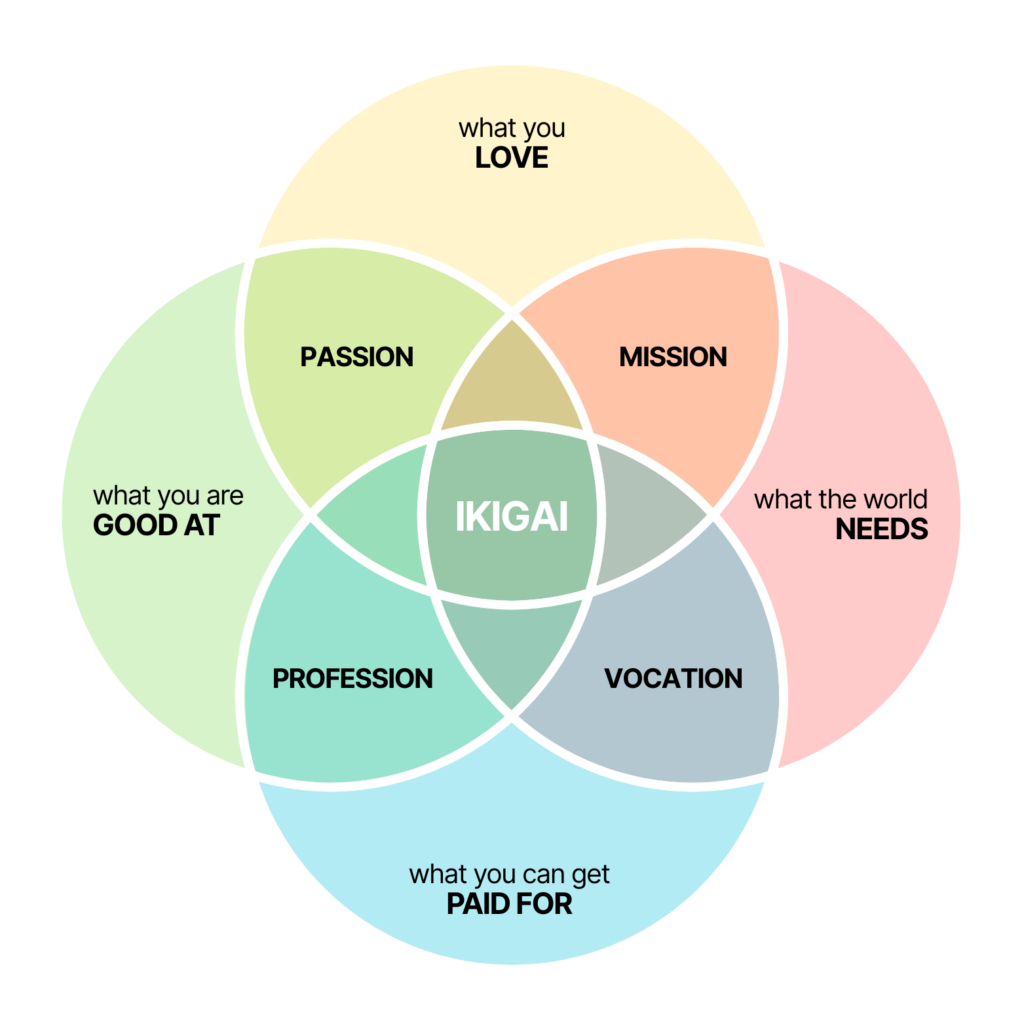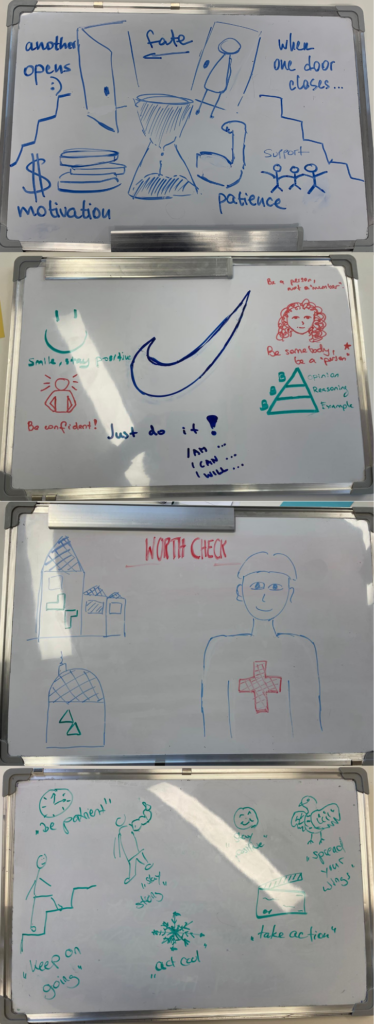Blog April 01, 2025, Third Week Honors Seminar
When you wake up in the morning: Do you get up happily, full of energy and optimism? Congratulations! You might have already found your IKIGAI – your purpose of life.
If that doesn’t sound like you, don’t worry – you’re not alone. Our encouraging takeaway from this week’s session is that we’ve all taken a small step closer. And after hearing the insights of Prof. Dr. Sarah Hatfield and Prof. Dr. Peter Cocron on optimism, you also might feel even more in tune with your own sense of purpose. In this lesson, we had the opportunity to reflect on our Ikigai, explore the connection between resilience, self-efficacy, and optimism, and consider how our perspective on the future – including our career path – can be influenced.



It’s all about purpose!
“What are you grateful for right now?” – That was the opening question of Sarah Hatfield’s presentation “Empowerment through Optimism: Contributions for Taking Action and Agency”. Before reading any further, perhaps take a moment to reflect on this question yourself!
Gratitude serves as one foundational resource for various psychological strengths. Our psychological capital consists of inner resources, that help us enhance our well-being, manage tough situations, and move forward with purpose. These inner resources include self-efficacy, hope, resilience, and the belief in our own ability to create a meaningful change.
Trust in yourself and your power to create impact – even when things go wrong. Sometimes, it’s important to take a step back, reflect on your goals, and ask yourself if they’re still aligned with who you are. And when life knocks you down, remember the famous Samuel Beckett saying:
“Ever tried. Ever failed. No matter. Try again. Fail again. Fail better.”
Stay grounded, focus on solutions, and bounce back stronger. This process empowers us to take meaningful, creative action – an important component of optimism, which is a powerful psychological resource itself!
What we can learn from the Japanese
Optimistic people often live aligned with their goals and what matters to them. They have found their purpose in life. The Japanese have a concept for it, called IKIGAI. It consists of four components, just like psychological empowerment:

- Meaningfulness – Your values, your energy, your investment: What does the world need?
- Self-determination – Your freedom of choice and action, your responsibility for your decisions: What do you love?
- Competence – Your skills, your self-efficacy, and confidence: What are you good at?
- Impact – Your ability to create meaningful outcomes through your actions: What can you be paid for?
If you find answers to all four questions, you will reveal your passion, your mission, your profession, and your vocation. If you can combine them, you have identified your IKIGAI. Sarah Hatfield encouraged us to reflect on these four questions and document our answers.
Maybe you would like to try this yourself? Simply start writing, just like we did… and see where the process takes you!
Everyone has different strengths, but when it comes to what the world needs, our answers are surprisingly similar.
This was an interesting insight we discovered when sharing our responses to the four Ikigai questions. It made us wonder: What if we discussed the idea of IKIGAI with our family, friends or community? Could it give us insights into what we truly need in these relationships?
Sarah Hatfield told us about the Okinawan Centerians – these really old aged people who live long, happily and healthy on the basis of their IKIGAI. If you want to know more about how to live a happy long life, check out the Netflix mini-series “Live to 100: secrets of the Blue Zones”.

Want to learn more about IKIGAI? Check out this video (German) or have a look at the book “Ikigai – The Japanese secret to a long and happy life” by Héctor García and Francesc Miralles.
The Surprising Power of Optimism in Job Search
In the second part of our seminar session with Prof. Dr. Peter Cocron, we explored the topic “Optimism and the Job Search” . Through discussions, reflections, and creative activities, we looked at how a positive mindset can help us navigate the often stressful and uncertain process of finding a job or internship.
We started by discussing why optimism can be helpful when searching for a job. Everyone shared personal experiences, both good and bad. It became clear that staying hopeful is often key to staying motivated. Together, we collected practical recommendations. Later on, we also got creative and visualized our ideas through sketches and drawings.
So, pay close attention – especially if you are a student and are currently looking for internships or entry-level jobs!
Some of the recommendations we came up with included:

Be patient. The job search takes time. It’s normal for the process to take longer than expected. Don’t let that discourage you.
Believe in your own ability. Self-efficacy matters — your belief in your own competence shapes how you face challenges and how persistent you are in reaching your goals.
Learn to deal with setbacks. Rejections are part of the process. Positive coping strategies — like actively working on the next step instead of avoiding action — can help you stay emotionally balanced.
Celebrate small wins and don’t forget your sense of humor. Whether it’s getting invited to an interview or writing a great cover letter — recognize your progress.
The job search isn’t always easy but with the right mindset, some encouragement, and a little optimism, it becomes a journey of growth and self-discovery. As Prof. Cocron said at the end of his session:
“No matter how bad the interview turns out, you’re one experience richer, and at least you got a (good) cup of coffee.”
Prof. Dr. Peter Cocron and Prof. Dr. Sarah Hatfield on their positive experiences with Job Search and advice for students.
So, what does it all come down to?
As we’ve explored in this session, psychology offers practical tools that can genuinely improve both, our personal and professional lives. Keeping these insights in mind, we can actively improve our emotional well-being and overall satisfaction.
Reflecting on the wisdom shared by the long-living Okinawan Centenarians, let’s remember the value of balanced nutrition, nurturing meaningful social relationships, embracing a stress-free mindset, and maintaining a clear, personal sense of purpose. Applying the Japanese concept of IKIGAI can further help us discover and pursue our passions, making our everyday experiences even more meaningful.
When it comes to job searching, we’ve learned that it’s essential to stay proactive and persistent. Don’t just wait for opportunities to come your way—take action, follow your interests and keep going, even after facing setbacks. Keep your spirits high, remembering that rejection can sometimes lead to even better opportunities. Believing in yourself and adopting positive coping strategies during tough times can significantly influence your success!
Finally, never underestimate the power of building genuine connections during interviews. Authenticity, positivity, and genuine engagement help you stand out. So, let’s take action, stay positive, and trust ourselves—success is within reach!
Prof. Dr. Peter Cocron and Prof. Dr. Sarah Hatfield have a conversation on what helps them to maintain an optimistic outlook on life.
Authors: Angelina Blon, Erik Bußjäger, Kathrin Polly, Filmon Zemo
Leave a Reply